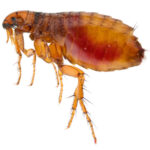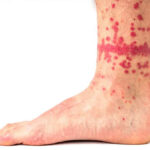
Ridding your home of fleas can be a daunting and costly endeavor. Unlike most household pests, fleas bite dogs and cats as well as people. The bites can cause intense itching and irritation, and a hypersensitive animal will often require veterinary assistance. Fleas can also transmit tapeworms and bacterial infections. The pests are highly prolific, the biting adult stage might be living on the pet, in addition to hundreds or thousands of eggs, larvae, and pupae elsewhere in the home or yard. If early signs of fleas are ignored, infestations can quickly spiral out of control. Flea eradication requires treatment of pets, and oftentimes the premises. Your level of success will depend on how these treatments are performed.
Adult fleas are not only a nuisance to humans and their pets, but can cause medical problems including flea allergy dermatitis (FAD), transmission of tapeworms, secondary skin irritations, and, in extreme cases, anemia. Although bites are often felt as a sharp pricking sensation, it is the resulting irritation caused by flea salivary secretions that varies among individuals. Some may experience a severe reaction (general rash or inflammation) that results in secondary infections caused by scratching the irritated skin area. Others may show no reaction after repeated bites over several weeks or months. Bites on humans are usually found on the ankles and legs.

The typical reaction to the bite is the formation of a small, hard, red, slightly raised (swollen) itching spot, surrounded by a red halo. Flea bites on sleeping people typically occur in clusters or lines of two or more bites. On pets, fleas tend to concentrate their bites to the neck, shoulder blades, and base of the tail regions.
Fleas are known to transmit bubonic plague from rodent to rodent and from rodents to humans. Oriental rat fleas can transmit Murine typhus (endemic typhus). Tapeworms use fleas as intermediate hosts to infest dogs and cats. The flea larvae may consume tapeworm eggs, the eggs develop into a larva that encysts in the flea muscles, and if an infested flea is eaten by a cat or dog, the tapeworm completes its development in the cat or dog gut.
If you experience fleas around your home, c
all the experts at Universal Pest Services (610)449-0740 and schedule a free inspection today!
 Ridding your home of fleas can be a daunting and costly endeavor. Unlike most household pests, fleas bite dogs and cats as well as people. The bites can cause intense itching and irritation, and a hypersensitive animal will often require veterinary assistance. Fleas can also transmit tapeworms and bacterial infections. The pests are highly prolific, the biting adult stage might be living on the pet, in addition to hundreds or thousands of eggs, larvae, and pupae elsewhere in the home or yard. If early signs of fleas are ignored, infestations can quickly spiral out of control. Flea eradication requires treatment of pets, and oftentimes the premises. Your level of success will depend on how these treatments are performed.
Adult fleas are not only a nuisance to humans and their pets, but can cause medical problems including flea allergy dermatitis (FAD), transmission of tapeworms, secondary skin irritations, and, in extreme cases, anemia. Although bites are often felt as a sharp pricking sensation, it is the resulting irritation caused by flea salivary secretions that varies among individuals. Some may experience a severe reaction (general rash or inflammation) that results in secondary infections caused by scratching the irritated skin area. Others may show no reaction after repeated bites over several weeks or months. Bites on humans are usually found on the ankles and legs.
Ridding your home of fleas can be a daunting and costly endeavor. Unlike most household pests, fleas bite dogs and cats as well as people. The bites can cause intense itching and irritation, and a hypersensitive animal will often require veterinary assistance. Fleas can also transmit tapeworms and bacterial infections. The pests are highly prolific, the biting adult stage might be living on the pet, in addition to hundreds or thousands of eggs, larvae, and pupae elsewhere in the home or yard. If early signs of fleas are ignored, infestations can quickly spiral out of control. Flea eradication requires treatment of pets, and oftentimes the premises. Your level of success will depend on how these treatments are performed.
Adult fleas are not only a nuisance to humans and their pets, but can cause medical problems including flea allergy dermatitis (FAD), transmission of tapeworms, secondary skin irritations, and, in extreme cases, anemia. Although bites are often felt as a sharp pricking sensation, it is the resulting irritation caused by flea salivary secretions that varies among individuals. Some may experience a severe reaction (general rash or inflammation) that results in secondary infections caused by scratching the irritated skin area. Others may show no reaction after repeated bites over several weeks or months. Bites on humans are usually found on the ankles and legs. The typical reaction to the bite is the formation of a small, hard, red, slightly raised (swollen) itching spot, surrounded by a red halo. Flea bites on sleeping people typically occur in clusters or lines of two or more bites. On pets, fleas tend to concentrate their bites to the neck, shoulder blades, and base of the tail regions.
Fleas are known to transmit bubonic plague from rodent to rodent and from rodents to humans. Oriental rat fleas can transmit Murine typhus (endemic typhus). Tapeworms use fleas as intermediate hosts to infest dogs and cats. The flea larvae may consume tapeworm eggs, the eggs develop into a larva that encysts in the flea muscles, and if an infested flea is eaten by a cat or dog, the tapeworm completes its development in the cat or dog gut.
If you experience fleas around your home, call the experts at Universal Pest Services (610)449-0740 and schedule a free inspection today!
The typical reaction to the bite is the formation of a small, hard, red, slightly raised (swollen) itching spot, surrounded by a red halo. Flea bites on sleeping people typically occur in clusters or lines of two or more bites. On pets, fleas tend to concentrate their bites to the neck, shoulder blades, and base of the tail regions.
Fleas are known to transmit bubonic plague from rodent to rodent and from rodents to humans. Oriental rat fleas can transmit Murine typhus (endemic typhus). Tapeworms use fleas as intermediate hosts to infest dogs and cats. The flea larvae may consume tapeworm eggs, the eggs develop into a larva that encysts in the flea muscles, and if an infested flea is eaten by a cat or dog, the tapeworm completes its development in the cat or dog gut.
If you experience fleas around your home, call the experts at Universal Pest Services (610)449-0740 and schedule a free inspection today!